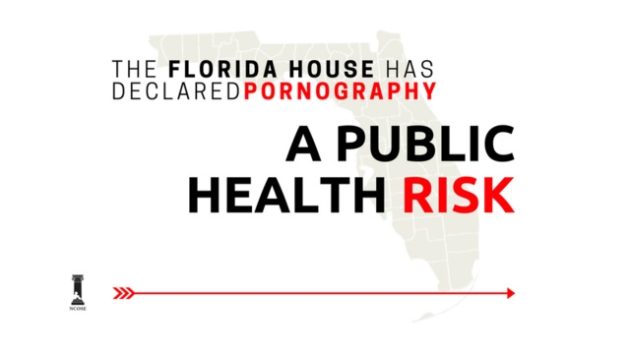Florida House Passes Resolution Declaring Pornography a ‘Public Health Risk’
Public Health Impacts of Pornography Are No Trivial Matter
This week Florida’s House of Representatives formally recognized the public health harms of pornography. The National Center on Sexual Exploitation (NCOSE) applauds this action and Rep. Ross Spano for spearheading this effort.
Public health impacts of pornography are no trivial matter.
The harms associated with pornography use are wide-ranging. For example, two recent meta-analyses (a process of a systematic review of several studies which yields greater statistical power) show a link between aggression and pornography use. Similarly, more than 50 studies (several longitudinal) on men have linked pornography use to lower sexual and relationship satisfaction. There are also dozens of studies linking pornography use to emotional and cognitive difficulties.
These disturbing findings are also consistent with neuroscience-based studies. It wasn’t long ago that the American public considered smoking innocuous—some doctors even touted faulty research claiming smoking was beneficial. But, today, much as X-ray photos of smoke-damaged lungs convinced skeptics of the harm caused by smoking, neuroimaging is revealing disquieting alterations to the brains of pornography users.
There are 38 neurological studies that suggest Internet pornography can cause addiction-related brain changes. Among them is a study published this month which reported significant reductions in grey matter, as well as decreased resting-state functional activity between certain brain centers among individuals with problematic hypersexual behavior (PHB) compared to a control group. Notably, those with PHB used pornography more frequently. The regions of the brain affected play a pivotal role in attention shifting and sustained attention, as well as reward-based behavioral learning.”
These findings are particularly alarming when considered in light of the number of young people exposed to pornography today. A 2017 study reported pornography exposure during adolescence is as high as 87%, with the median age for first viewing being 13 for boys and 16 for girls.
Today, young people with smartphones carry access to the world of XXX with them wherever they go. The potential harmful impact of pornography on their developing brains, relationships, and sexual templates is apparent to educators, therapists, parents, and young people themselves. As one 14-year-old boy put it, “I want help. I want it to end . . . I want to be able to go to school and not have pornography on my mind.”
With this week’s action, Florida joined a growing list of states officially recognizing pornography’s public health risks. These include Utah, South Dakota, Tennessee, Arkansas, Louisiana, and Kansas. The house chambers in both Virginia and Pennsylvania have done likewise.
For an overview of representative research on the harms of pornography visit: endsexualexploitation.org/
Lisa L. Thompson
VICE PRESIDENT OF RESEARCH AND EDUCATION
Lisa L. Thompson serves as the Vice President of Research and Education for the National Center on Sexual Exploitation, where she oversees NCOSE’s strategic planning for increased public understanding of sexual exploitation related issues. To this end Lisa conducts analysis, develops research initiatives, and liaises with a wide-range of public officials, non-profit organizations, institutions of higher learning, and academics to generate collaborative action to combat the full spectrum of sexual exploitation especially as pertains to the harms of pornography, stripping, prostitution, and sexual trafficking.
Lisa joins the NCOSE following nearly two years with World Hope International (WHI), where as its Director of Anti-Trafficking, Lisa administered WHI’s anti-trafficking and sexual-violence recovery programs in Azerbaijan, Cambodia, Liberia and Sierra Leone. While working for WHI Lisa also served as a steering committee member of the Faith Alliance Against Slavery and Trafficking (FAAST), a collaboration initiative she helped found, and as a reviewer for the Journal of Human Trafficking.
She has written on the subjects of sexual trafficking and commercial sexual exploitation for publications such as Christian History and Biography, Caring, Mutuality, PRISM, and Social Work and Christianity. Lisa is a contributing author to Hands that Heal: International Curriculum for Caregivers of Trafficking Survivors, as well as the bookGlobal Perspectives on Prostitution and Sex Trafficking: Europe Latin America, North America, and Global in which she contributed chapters about the use of torture by pimps, as well as the policy conflicts between sex trafficking abolitionists and HIV/AIDS advocates. She is the co-editor of a special anti-trafficking edition of the North American Association of Christians in Social Work journal Social Work & Christianity and has provided expert testimony to the U.S. Congress. Lisa routinely speaks about sex trafficking and commercial sexual exploitation (i.e. prostitution, pornography, stripping), and facilitates anti-trafficking training events for a diverse range of audiences.
Additionally, Lisa served for more than 12 years as the Liaison for the Abolition of Sexual Trafficking for The Salvation Army USA National Headquarters. In that role she pioneered strategies for The Salvation Army to create recovery services for survivors of sexual trafficking and advocated on public policy issues and initiatives related to combating sexual trafficking and other forms of commercial sexual exploitation. Lisa chaired The Salvation Army’s North American Anti-Trafficking Council and directed its Initiative Against Sexual Trafficking. Previous to her arrival at The Salvation Army, Lisa served as Policy Representative for the National Association of Evangelicals’ (NAE) Office for Governmental Affairs in Washington, DC, from 1998 to 2001. While there, she was heavily involved in NAE’s advocacy efforts seeking passage of legislation now known as the Trafficking Victims Protection Act of 2000. She has also worked for consulting firms managing Community Develop Block Grants programs in Kentucky, and taught English as a second language in the People’s Republic of China.
Lisa earned her Bachelor of Arts in Government from Western Kentucky University, and her Master’s degree in Leadership, Public Policy and Social Issues from Union Institute and University.




Leave a Reply
Want to join the discussion?Feel free to contribute!